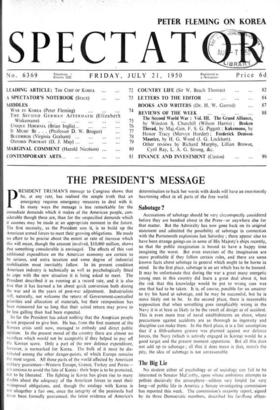Sabotage ?
Accusations of sabotage should be very circumspectly considered before they are bandied about in the Press—or anywhere else for that matter. But the Admiralty has now gone back on its original statement and admitted the possibility of sabotage in connection with the Portsmouth explosions last Saturday ; there appear also to have been strange goings-on in some of His Majesty's ships recently, so that the public imagination is bound to have a happy time imagining the worst. But even exercises of the imagination are more profitable if they follow certain rules, and there are some known facts about sabotage in general which ought to be borne in mind. In the first place, sabotage is an art which has to be learned. It may be unfortunate that during the war a great many energetic young men in this country did learn a great deal about it, but the risk that this knowledge would be put to wrong uses was one that had to be taken. It is, of course, possible for an amateur to try his hand at sabotage, and he may be successful, but he is more likely not to be. In the second place, there is reasonable supposition that when something goes inexplicably wrong in the Navy it is at least as likely to be the result of design as of accident. This is even more true of naval establishments on shore, where precautions against accidents are as thorough as ingenuity and discipline can make them. In the third place, it is a fair assumption that if a fifth-column gesture was planned against our defence forces, the Navy (which is actively engaged in Korea) would be a good target and the present moment opportune. But all this does not add up to sabotage ; all that it does mean is that, more's the pity, the idea of sabotage is not unreasonable.


































